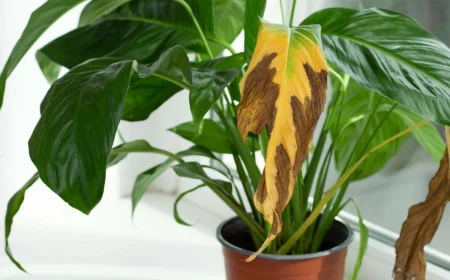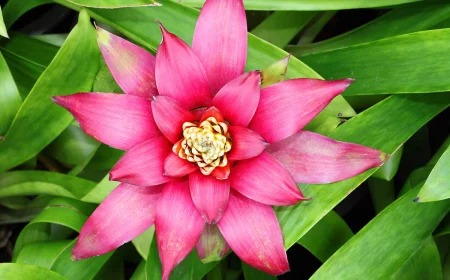Don’t Be Scared to Prune Your Roses: A Guide to Getting it Right
I’ve spent more years than I can count with my hands in the dirt, and if there’s one task that truly intimidates people, it’s pruning roses. I get it. It feels destructive. I’ll never forget what my first real mentor in horticulture told me. He watched me nervously snipping at a rose bush, then stopped me and said, “You’re not just cutting. You’re telling the plant where to put its energy. Make every cut count.”
In this article
That one sentence changed everything for me. Pruning isn’t about hacking a bush down to size; it’s a thoughtful conversation with the plant. It’s how we guarantee its health, build a strong foundation, and, of course, get those spectacular blooms we’re all after.
So, this isn’t just a list of rules. We’re going to dive into the why behind the cuts. Once you understand the logic, the confidence to grab those pruners will follow. I promise.

By the way, if you’re feeling totally overwhelmed, here’s a quick win: Go outside right now and find one, single, obviously dead cane on your rose bush. It’ll be brown or black and totally dry. Snip it off at the base. That’s it. You’ve just made your first smart cut and started the conversation. See? You can do this.
The ‘Aha!’ Moment: Why Pruning Actually Works
Before you make another cut, let’s talk about a simple plant science concept that’s key to everything. It’s called “apical dominance.” Sounds fancy, but it just means the top bud on any stem is the boss. It sends out hormones that tell all the lower buds to chill out and not grow.
When you prune a cane, you chop off that bossy top bud. Suddenly, the chain of command is broken. The plant redirects all that stored-up energy to the side buds just below your cut. The one closest to the cut usually becomes the new leader, growing stronger and faster than the rest. And just like that, you’ve told the plant exactly where to grow next.

This is where it gets good. By choosing an outward-facing bud to cut above, you encourage the new branch to grow out, not in. This opens up the center of the plant like a vase. Why does that matter? Better airflow, my friend. Good air circulation is your number one weapon against nasty fungal diseases like black spot and powdery mildew. More sun hitting the leaves also means more energy for making flowers. We’re not just making it look pretty; we’re engineering a healthier, happier plant.
Your Rose Pruning Shopping List (and What it’ll Cost)
Using the wrong tools for the job is a recipe for frustration and can even hurt your roses. You don’t need a shed full of gear, just a few key items. Invest in quality here, and your hands (and plants) will thank you.
- Bypass Pruners: This is your workhorse tool for most canes. They have two curved blades that slice past each other like scissors, making a clean cut that heals fast. Please, whatever you do, avoid anvil-style pruners (the ones with a single blade that smashes down on a flat base). They crush stems and invite disease.
Budget: A solid pair from a brand like Fiskars will get the job done for around $25-$30 at any big box store.
Pro-Level: If you plan on doing this for years, investing in a pair of Felco pruners for $50-$90 is worth every penny. They last a lifetime with a bit of care. - Bypass Loppers: Think of these as long-handled pruners. They give you the leverage to cut through canes thicker than about a half-inch without a struggle. The long handles are also great for reaching into the middle of a thorny beast without getting shredded. You can find decent ones for about $30-$50.
- A Small Pruning Saw: For those really thick, old, woody canes (over an inch and a half), a saw is a must. They’re designed to cut on the pull stroke, which gives you more control. A basic folding saw runs about $20-$35 and is incredibly useful to have around.
- Real Gloves: I’m not talking about flimsy cloth gloves. You need protection. Sporotrichosis, or “rose gardener’s disease,” is a nasty fungal infection you can get from thorn pricks. Invest in a pair of leather gauntlet gloves that go up your forearms. They’ll cost you between $25 and $40, but it’s much cheaper than a doctor’s visit. Seriously, don’t skip this.
- Rubbing Alcohol: Grab a spray bottle and fill it with 70% isopropyl alcohol. This is for cleaning your tools between bushes to prevent spreading disease. A bottle costs a couple of bucks and is a non-negotiable part of pro-level care.

When to Prune: Let Nature Be Your Guide
Most guides say “prune in late winter,” but what does that even mean? It’s all about avoiding a late, hard frost. Pruning triggers soft, tender new growth, and if a sudden freeze hits, that new growth can get zapped, setting your plant way back.
Forget the calendar and look for clues in your own backyard. For most climates, the best time to do your main pruning is when the forsythia bushes start to bloom their bright yellow flowers. It’s nature’s way of saying the worst of winter is over. Another great sign is when you see the little reddish bud “eyes” on your rose canes starting to swell and get bigger.
- In Colder Climates: Patience is everything. It’s far better to prune a bit late than too early. You might be looking at April or even early May. I once got too eager and pruned a whole project of roses in late March, only for a surprise blizzard to hit. We had to re-prune everything, and the plants sulked for the rest of the year. Lesson learned.
- In Moderate Climates: You’ve got more wiggle room. February or early March is usually the sweet spot.
- In Warm Climates: You can often get started as early as January. Your roses might not even go fully dormant, so this big prune acts as a reset, telling them it’s time to kick off a new major bloom cycle.
Heads up! There’s one big exception: traditional, once-blooming roses (like many classic Albas, Gallicas, and Damasks). These types bloom on last year’s growth. If you prune them in the spring, you’ll cut off all your flowers. For these, you wait until after they finish blooming in the summer to do any shaping.

How to Prune: A Beginner’s 4-Step Game Plan
Okay, you’ve got your tools and the timing is right. Feeling nervous? Don’t be. Your first time with a medium-sized bush might take you an hour as you second-guess every cut. That’s normal! Once you get the hang of it, it’s a 15-minute job. Here’s a simple plan to get you started.
- The Health Check (The 3 D’s): Before you even think about shape, focus on health. Your first job is to remove anything that’s Dead (brown/black and dry), Damaged (broken or cracked), or Diseased (has dark, sunken spots). Cut these canes all the way back to the base or to a healthy part of the plant.
- Clear the Clutter: Now, look for any spindly, weak canes—anything thinner than a pencil. They won’t make good flowers and just sap energy. Get rid of them. Also, remove any canes that are growing inward toward the center or are rubbing against another cane. The goal is to open things up.
- Make the Shaping Cuts: This is where you shorten the remaining healthy canes to encourage new blooms. A good rule of thumb for most shrub-type roses is to reduce their overall size by about one-third to one-half. Always try to make your cut about 1/4 inch above an outward-facing bud. This tells the new branch to grow out, not in.
- Step Back and Look: Seriously, after a few cuts, put the pruners down, step back five feet, and look at the plant’s overall shape. Are you creating that open, vase-like structure? Does it look balanced? This pause is the most important part of the process.
Quick tip: Your cuts should be at a 45-degree angle, slanting away from the bud. This lets rain run off instead of pooling and causing rot. But honestly? Don’t panic if your first few cuts are a bit off. A slightly high or sloppy cut is way better than not pruning at all. The rose will forgive you.

Tailoring Your Pruning to Different Rose Types
A one-size-fits-all approach doesn’t really work. The pros adjust their technique based on how the rose naturally wants to grow.
Hybrid Teas & Grandifloras (The Classic Long-Stem Roses)
These are the roses you grow for those perfect, single flowers on long stems. They love a hard prune. After cleaning out the dead and weak stuff, pick the best 3 to 5 strongest canes and remove everything else. Then, cut those remaining canes down hard, to about 12-18 inches from the ground. It will look shockingly bare, but trust me, this is what you want! That’s how you get those incredible, long-stemmed blooms.
Floribundas (The Flower Machines)
These are all about producing big clusters of flowers for a massive color show. They need a lighter touch than hybrid teas. After the initial cleanup, just reduce the overall height by about one-third. If you prune them too hard, you’ll ruin their naturally bushy shape. Be conservative; you can always take more off later.

Climbing Roses (The Vertical Showstoppers)
This is where people get really confused. For the first two or three years, do very little pruning! You can snip off dead tips or broken bits, but your main job is to let the plant produce long, flexible canes. Train these main canes horizontally along your fence or trellis. Tying them sideways tricks the plant into sending up a whole bunch of smaller, flower-producing shoots all along the cane. After that, your annual prune is simple: just shorten those smaller side shoots, leaving a few inches on each.
Shrub & English-Style Roses
This big group includes tough modern shrubs and those romantic, multi-petaled English-style roses. The goal here is to maintain their natural, graceful shape, not force them into a rigid form. A light touch is best. After the basic health cleanup, just reduce the overall size by about a third to keep it from getting overgrown.

After the Cut: The Final, Crucial Steps
You’re not done when the pruning is finished. What you do next is critical for a healthy season.
First, clean up! Meticulously rake up every single cut cane and fallen leaf from around the plant. This stuff can harbor disease spores that will just reinfect your plant. Bag it and put it in the trash, not your compost pile. This is a zero-tolerance rule in professional gardens.
Second, feed and mulch. Pruning is the plant’s wake-up call. Once you see about an inch of new growth, it’s time to give it breakfast. Apply a good granular rose fertilizer or a generous layer of compost around the base. Then, add a 2-3 inch layer of mulch (like shredded bark or leaf mold), making sure to keep it from touching the canes directly. This will hold in moisture, keep weeds down, and give your rose the perfect start to a beautiful season.

Inspiration:


Your pruning is only as good as your tools. Think of them as a long-term investment in your garden’s health. For most cuts, you’ll need:
- Bypass Pruners: Essential for stems up to 3/4-inch thick. Their scissor-like action makes a clean cut that heals quickly. Models like the Felco F-2 are a lifetime investment for a reason.
- Bypass Loppers: For canes between 3/4-inch and 1.5 inches. The long handles provide the leverage you need to cut through thicker, older wood without a struggle.
- Pruning Saw: The tool for any cane thicker than 1.5 inches. Its sharp, curved blade cuts on the pull stroke, preventing it from binding in the wood.
The secret? Keep them sharp and always disinfect the blades with rubbing alcohol between plants to prevent spreading diseases.

The oldest known living rose bush, the Rose of Hildesheim in Germany, is believed to be over 1,000 years old. Its survival is attributed in part to careful, consistent pruning.
This isn’t just a modern gardening fad; it’s an ancient conversation between humans and plants. Each cut you make is part of a long tradition of shaping beauty and ensuring longevity, connecting your garden to centuries of horticultural wisdom.

Hybrid Tea Roses: These are the divas known for their long stems and classic, single blooms. Prune them hard in late winter, down to 3-5 strong canes, each about 12-18 inches from the ground. This channels all the plant’s energy into producing those spectacular, exhibition-worthy flowers.
Floribunda Roses: As their name suggests, these produce abundant clusters of flowers. They require a lighter touch. Prune them back by about a third of their height, focusing on thinning out the center to create an open, twiggy framework that can support masses of blooms.

What do I do with all the clippings after I’m done?
Don’t just leave them on the ground or toss them in the compost! Rose clippings, especially from plants that might have had fungal issues like black spot, can harbor disease spores that will happily reinfect your garden next season. The best practice is to dispose of them completely. Bag them up and put them in your household waste. A clean finish is just as important as a clean cut.
The Most Important Cut: Beyond shaping the bush, your primary goal is to improve air circulation. Rose diseases thrive in stagnant, damp conditions. By removing any canes that cross over one another or grow inward toward the center of the plant, you are creating an open, vase-like shape. This simple act allows sunlight and air to penetrate the entire bush, which is nature’s best defense against powdery mildew and black spot.










